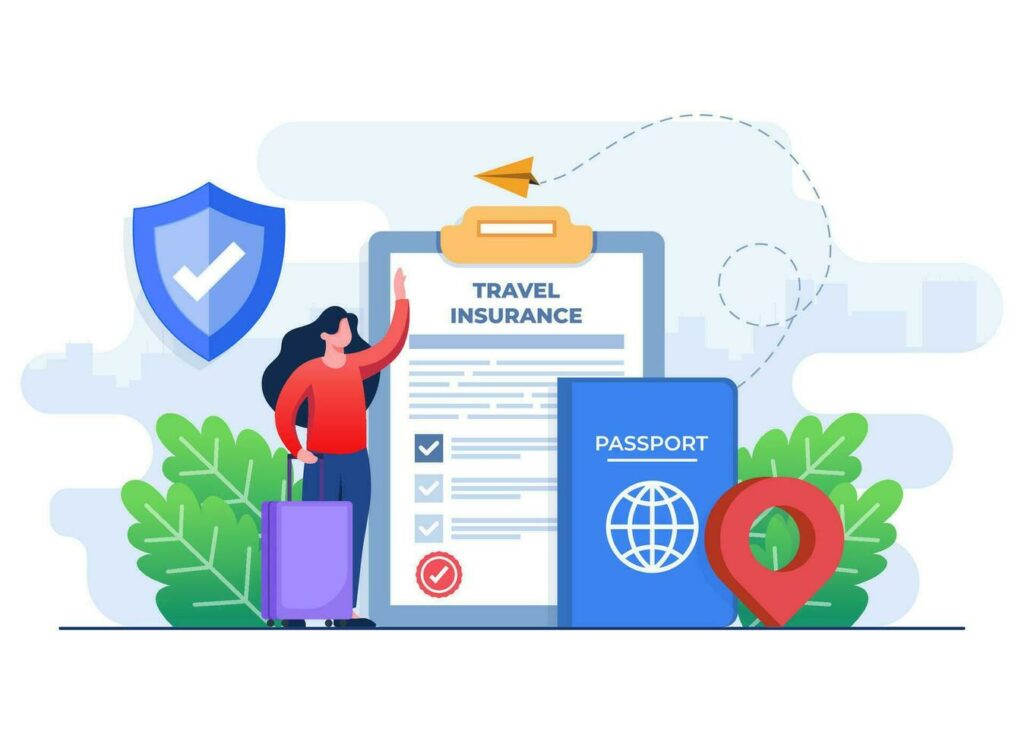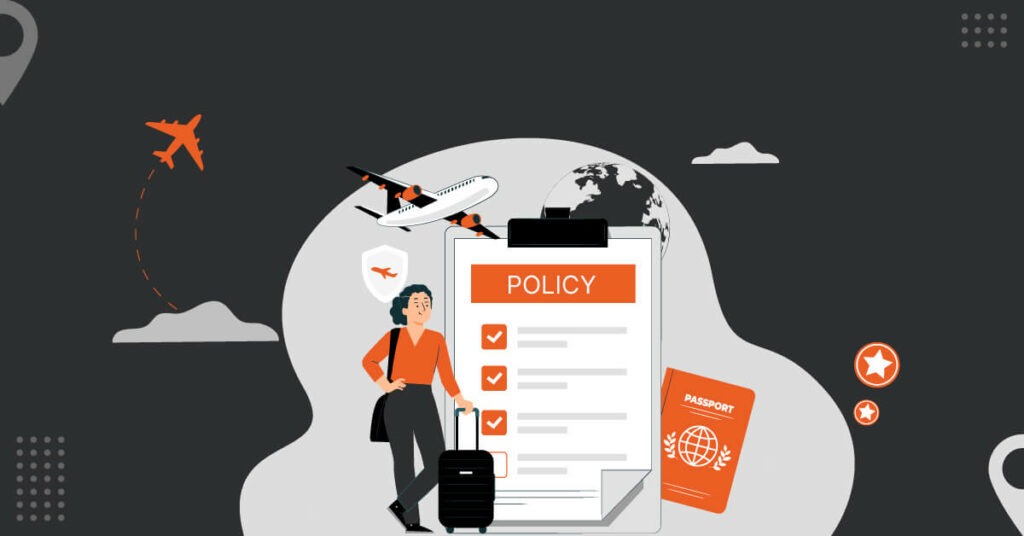Business trips are necessary but require a planning element to run smoothly. Corporate travel policies are an essential tool to keep employees safe, manage costs, and help employees be productive on business trips. This article aims to provide an overview of essential policies you should adopt for the planning of a company’s business trips.
These policies deal with employee well-being, booking streams, and cost savings. When you put these policies in place, you can improve your business travel program and help make it more successful.
Table of Contents
Travel Policies Companies Should Discuss
Here’s a rundown of the top travel policies your company can consider:
Employee Well-Being Policies
As your employees are the most valuable part of your business, take their safety and well-being into heavy consideration during business travel. Your company should have a comprehensive travel policy that can act as a well-being and safety guide. Your travel policy outlines standards for lodging that are reasonably safe with appropriate lighting and fire safety systems.
The policy should also provide direction on emergency situations, such as illnesses encountered while overseas or lost passports. Employees need to know who they are to contact for assistance; this could be your company’s emergency response team or the appropriate embassy.
Remind employees to be informed by checking government travel notices prior to their trip so they know what risks and safety precautions they’ll face in their destination.
Expenses and Booking Policies
Improving the travel booking and expense management process can save everyone time and effort.
Travel Benefits with Discounts
Partner with travel suppliers to provide employee travel benefits with discounts. Pre-negotiated travel benefits provide the best prices.
Travel Booking Process
Integrate travel booking platforms into company systems. Employees can search for flights, hotels, and car rentals within company policies. Travel booking platforms track expenses and receipts – you no longer have to deal with hard copies of expense receipts.
Expense specification
Outline exactly which travel expenses are eligible for reimbursement: airfare, meals, taxis, local transport, etc.
Establish spending limits based on the destination and duration of the trip; for example, shorter trips to neighboring cities might have lower food allowances than a long conference in a large city.
Reimbursement with company cards
Issue company credit cards for travel expenses only. This streamlines the need for an employee to pay upfront, improves expense monitoring, and eliminates needless steps when auditing expenditures. The company will receive one combined invoice for all travel expenses, making the process less complicated for everybody.
Cost-control policy
While we know that business travel can be costly, here’s how to keep travel expenses under control with clear travel policies:
Advance booking
Encourage employees to book flights and accommodation early, especially during peak season, to qualify for early booking discounts.
Travel Class
Establish travel class policy and guidelines based on travel duration and destination. – Economy may work for short-distance travel, while business-class travel may be necessary for extended work travel to improve productivity.
Meal Allowances
Establish a daily or per-trip allowance for meals or food. These limits can be adjusted when necessary based on regional differences in cost of living.
Alternate Travel Costs
Use video conferencing and other online communication mechanisms to reduce unnecessary travel costs, where possible.
Employee Health and Productivity
Support employee health and productivity during business travel and build up productive travel for positive experiences:
Flexibility
Provide flexible options to mitigate travel fatigue, such as flexible flight times and choice of preferred accommodations as budget allows.
Technology
Promote the use of travel apps for flight updates, boarding, and expense management to streamline the process.
Perks
Show employee appreciation through small perks like airport lounge access or travel insurance coverage, enhancing their travel experience.
Clear Communication
Communicate the travel policy clearly and transparently to all employees. Regularly review and update the policy to reflect any changes in company needs or industry best practices.
Sustainability Policies
More companies are prioritizing sustainability. Do your travel policies contribute to those initiatives?
Carbon Offset Programs
To reduce the environmental impact of air travel, companies can invest in eco-friendly projects, such as renewable energy initiatives or reforestation projects, to “offset,” or “neutralize,” the carbon footprint from travel.
Eco-Friendly Transportations
Encourage employees to consider sustainable transportation methods, such as train travel, bus travel, or even electric vehicles. Sustainable travel is really going to reduce carbon emissions and lead to better wellness for employees personally.
Additional Considerations
Here are a few additional considerations to keep in mind when choosing your travel policies.
Employee Education: Make sure that employees understand the company’s travel policies with training to cover the content, expectations, and process.
Policy Review: Regularly review and revise your travel policies to meet changing industry trends, employee needs, and company goals.
Policy Enforcement: Consistently enforce the travel policies to ensure all employees comply with your established policies.
Business Travel Policies: Best Practices in 2025
Our travel policies need regular updates to remain effective. Make continuous improvements through employee feedback analysis together with travel trend adjustments.
A business travel policy requires thorough examination of essential elements. Each section of the business travel policy should be examined in detail to identify the best solutions.

Involve Key Stakeholder
Your policy development process needs active involvement from multiple stakeholders. The policy requires participation from HR, finance, operations, and frequent travelers. The process enables the inclusion of every person’s requirements, from booking challenges to financial record management. The policy stays aligned through consistent meetings with these individuals, which leads to smoother update processes.
Focus on Communication
The key to happy travels lies in creating satisfied employees. Hearing their opinions about policy changes should be your priority. People working for the company may maintain personal preferences regarding their preferred airlines and hotel chains.
By keeping them informed throughout the policy process, from creation to updates, you can avoid unnecessary frustration and ensure everyone feels heard.
Enhance Operational Efficiency
The travel policy must avoid collecting dust on a shelf! Scheduling regular check-ins represents an essential practice for effective travel management. The approach enables you to detect efficient methods while identifying ineffective ones so you can adjust your operations to maintain the perfect combination of employee safety, cost efficiency, and company requirements. The process operates similarly to maintaining a properly functioning system that achieves business travel success.
Risk Management
Business travel routinely faces unanticipated problems, which range from poor weather conditions to street demonstrations. The best travel policies need to address these potential threats. Companies need to address these potential challenges through proactive thinking, which includes preparing for flight cancellations and lost passport situations.
The core objective aims at reducing risks while ensuring complete safety for your employees at all their travel destinations.
Set Policies To Benefit Everyone
In summary, implementing these effective business travel policies empowers your company to create a seamless and enjoyable travel experience for your employees. These policies not only enhance employee well-being and safety but also lead to cost savings for the organization.
By regularly reviewing and updating your travel policy and actively seeking feedback from your employees, you can elevate your business travel program to new heights, ensuring continued success and productivity.
Employee Well-Being and Productivity
Encourage employee well-being and productivity in business travel to foster productivity and positive travel experiences:
Flexibility
Provide options that reduce travel fatigue, such as flexible flight times and preferred accommodations (within budget).
Technology
Promote the use of travel apps for flight updates, boarding, and expense management to streamline the process.
Perks
Show employee appreciation through small perks like airport lounge access or travel insurance coverage, enhancing their travel experience.
Clear Communication
Communicate the travel policy clearly and transparently to all employees. Regularly review and update the policy to reflect any changes in company needs or industry best practices.
Sustainability Policies
Many companies are placing a greater emphasis on sustainability. Your travel policies can contribute to these efforts:
Carbon Offset Programs
To mitigate the environmental impact of air travel, businesses can invest in eco-friendly initiatives like renewable energy projects or reforestation, essentially “neutralizing” the emissions generated by travel.
Eco-Friendly Transportation
Encourage employees to opt for sustainable transportation methods like trains, buses, or electric vehicles for business trips. This not only reduces carbon emissions but also enhances personal well-being.
Virtual Gatherings
Promote virtual meetings and other online tools for communication, especially for shorter or internal discussions, to minimize unnecessary business trips.
Additional Considerations
Here are a few additional considerations to keep in mind when choosing your travel policies.
Employee Education
Ensure that employees fully grasp the company’s travel policies by providing comprehensive training on content, expectations, and procedures.
Policy Optimization
Periodically evaluate and revise your travel policies to adapt to evolving industry trends, employee requirements, and company objectives.
Policy Adherence
Consistently implement the travel policies to guarantee that all employees adhere to the established guidelines.
Business Travel Policies: Best Practices in 2024
Your travel policies aren’t a one-time thing. Keep it up-to-date by listening to employees, looking at the data, and adjusting as travel styles and needs change.
We’ve covered some key areas for a strong business travel policy. Let’s delve deeper into some best practices to consider for each section.
Involve Key Stakeholder
Don’t write your policy in a silo! Get input from HR, finance, operations, and frequent travelers. This ensures everyone’s needs are considered, from booking hassles to expense tracking. Regular chats with these key players keep the policy on track and make updates smoother.
Focus on Communication
Happy employees make for happy travel! Listen to their feedback, especially when making changes to the policy. After all, some employees might have favorite airlines or hotels.
By keeping them informed throughout the policy process, from creation to updates, you can avoid unnecessary frustration and ensure everyone feels heard.
Practice Continuous Improvement
Your travel policy shouldn’t collect dust on a shelf! Regular check-ins are key. This allows you to see what’s working, what’s not, and make adjustments to keep employee safety, costs, and company needs in perfect balance. Think of it as fine-tuning a well-oiled machine for happy and productive business travel.
Involve Risk Management
Business travel can come with unexpected bumps, like bad weather or even protests. A strong travel policy should consider these risks. This means thinking ahead and planning for what could go wrong, like flight cancellations or lost passports.
The goal is to minimize these risks and keep your employees safe and sound wherever they travel.
Set Policies To Benefit Everyone
In summary, implementing these effective business travel policies empowers your company to create a seamless and enjoyable travel experience for your employees. These policies not only enhance employee well-being and safety but also lead to cost savings for the organization.
By regularly reviewing and updating your travel policy, and actively seeking feedback from your employees, you can elevate your business travel program to new heights, ensuring continued success and productivity.
Ready to improve your company’s business travel program? Contact EvolveDash today to discuss how we can help you design effective travel policies that keep your employees safe, save on costs, and boost productivity.



















